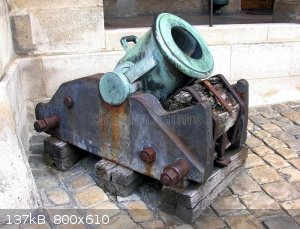| Pages:
1
2 |
aga
Forum Drunkard
    
Posts: 7030
Registered: 25-3-2014
Member Is Offline
|
|
Well, that is unexpected !
Glad you like it. Certainly wasn't deliberate.
Contact Sigma and see if they want to buy it - we can go halves 
As for crushing that beauty, no way !
It just fitted well in the brass mortar (or pestle - never can get those two straight)
|
|
|
LearnedAmateur
National Hazard
   
Posts: 513
Registered: 30-3-2017
Location: Somewhere in the UK
Member Is Offline
Mood: Free Radical
|
|
Mortar is the vessel itself, I just think of it like the mortar weapon, back when they were shorter and fatter they were quite reminiscent of the
crushing-up version.
Mortar comes from Latin ‘mortarium’, which was a vessel for crushing. Pestle is from ‘pistillum’, directly translating to ‘pounder’. An
interesting fact, the word mortar when used in a bricklaying sense, is derived from the Old French word for the bowl used to mix builder’s plaster -
mortier.

In chemistry, sometimes the solution is the problem.
It’s been a while, but I’m not dead! Updated 7/1/2020. Shout out to Aga, we got along well.
|
|
|
aga
Forum Drunkard
    
Posts: 7030
Registered: 25-3-2014
Member Is Offline
|
|
Excellent explanation o Amateur of Learnedness.
Easy to remember too. Thanks.
Presumably 'mortier' also has it's roots in the same Latin word 'mortarium'.
|
|
|
LearnedAmateur
National Hazard
   
Posts: 513
Registered: 30-3-2017
Location: Somewhere in the UK
Member Is Offline
Mood: Free Radical
|
|
Looking it up, the name of the weapon actually comes from the bowl, didn’t even know that when I made the mental link. Makes sense on both the
visual and linguistic side - one could interpret the weapon to be a ‘vessel of crushing’ since the original projectiles were stone, used as a
siege engine before being converted to anti-personnel usage.
Seems that way, a vast number of words in Western European languages (antiquated and modern) have their roots in Latin and Greek, and the different
etymological pathways is where, at least in English, a lot of homonyms are born - same meaning from the parent language but having been twisted
throughout the course of history and the evolution of language.
In chemistry, sometimes the solution is the problem.
It’s been a while, but I’m not dead! Updated 7/1/2020. Shout out to Aga, we got along well.
|
|
|
aga
Forum Drunkard
    
Posts: 7030
Registered: 25-3-2014
Member Is Offline
|
|
Fascinating - a vessel into which you place things to get crushed morphs into a vessel that throws a thing out that crushes.
Flipped meanings are not uncommon, yet it takes a mental leap to comprehend (In focused vs Out)
|
|
|
| Pages:
1
2 |